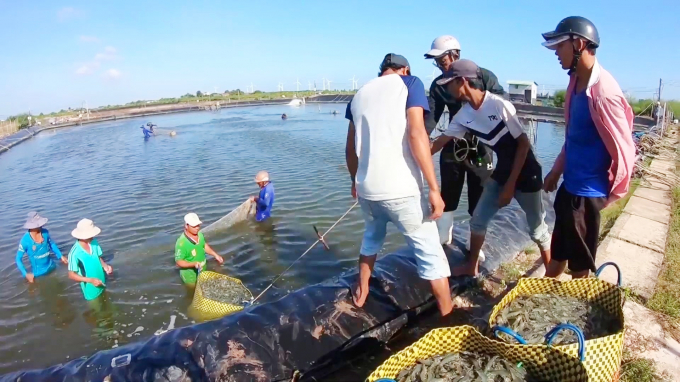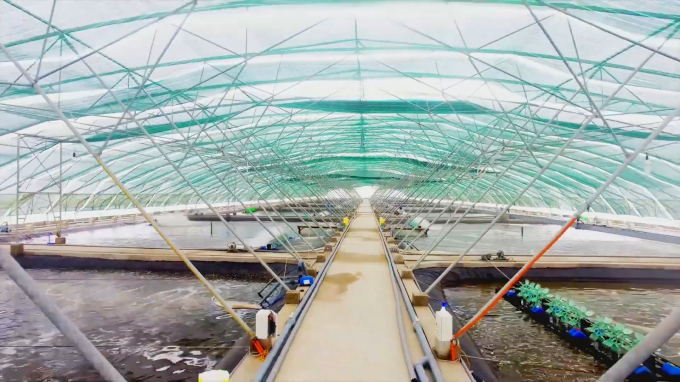May 24, 2025 | 16:29 GMT +7
May 24, 2025 | 16:29 GMT +7
Hotline: 0913.378.918
May 24, 2025 | 16:29 GMT +7
Hotline: 0913.378.918

Harvesting shrimp in the Mekong Delta. Photo: Van Vu.
Those conclusions are outlined by many farmers and governance bodies at provincial level in Soc Trang after some recent crops that produce good yield.
In the past 2 years, due to the severe impact of the Covid-19 pandemic, together with the unpredictable fluctuations of the world market, the price of input materials of the seafood industry in general and shrimp farming in particular has increased.
However, thanks to the application of farming model in the direction of high technology, with linkages in the production chain, many cooperatives, farmers and businesses have overcome this difficult period.
Agriculture and Fisheries Cooperative October 14 is one of the famous hi-tech shrimp farming cooperatives in My Xuyen district, Soc Trang province. The cooperative is currently developing two main shrimp products, whiteleg shrimp and black tiger shrimp, on a total area of over 31 hectares.
According to Ngo Cong Luan - Director of the cooperative, the rising price of feed and fuel makes the shrimp farming sector face many difficulties. However, thanks to the association with businesses to raise shrimp according to ASC's clean standards for export to Europe, the annual shrimp production of the cooperative has increased, maintaining a stable profit. According to the cooperative's calculations, in 2021 alone, the cooperative's farmed shrimp output reached more than 160 tons, bringing in a revenue of VND 17 billion.
The Directorate of Fisheries (under the Ministry of Agriculture and Rural Development) determines that, in addition to whiteleg shrimp, black tiger shrimp is one of Vietnam's current strength products in the market. Vietnam is now the main and biggest producer providing black tiger shrimp for the world market. The agricultural sector is studying options to develop farming models of forest - shrimp (shrimp farming in areas such as mangroves), rice - shrimp (shrimp farming in rice field), and extensive shrimp farming with the aim of increasing productivity to help people feel secure when applying.
These models are considered sustainable, bringing high economic value. Tran Dinh Luan - Director of the General Department of Fisheries affirms: "These are models that are well adapted to climate change, drought, saltwater intrusion. Farming black tiger shrimp is one of the models that combine growing rice, farming shrimp, and planting forests that can provide natural food for shrimps. Farming black tiger shrimp can also contribute to reducing emissions. I think this is a strength of Vietnam, and along with the participation of the people, research agencies, management agencies, black tiger shrimp is one of our priorities in the coming time. We must continue to develop."

Modern shrimp farming is becoming a new developing direction in the Mekong Delta. Photo: Van Vu.
At the same time, the leader of the Directorate of Fisheries also says that the research agencies will continue to select the brood stock to provide to farmers, study the farming process to have better productivity for farmers. He believes that black tiger shrimp is a premium organic product that can be supplied to large markets. Once the value of shrimp increases, the income of people farming black tiger shrimp will increase.
At a recent meeting to find solutions to "develop the shrimp sector in 2022" in Soc Trang province, Deputy Minister of Agriculture and Rural Development Phung Duc Tien also set out a series of solutions for the shrimp sector to maintain its positive growth and will reach US$ 4.1 billion in revenue in 2022. Consequently, the requirements for the shrimp sector are to closely review the breeding work, improve the seed production capacity, because once we have new good varieties we can produce and determine the yield and output quality of shrimp.
In addition, the Deputy Minister also asked professional agencies from the Ministry of Agriculture and Rural Development to find solutions to control input materials to reduce feed costs. At the same time, agencies must fine solutions to monitor to handle diseases on shrimp more effectively.
“Markets are now having more and more strict requirements but we have to conquer more markets, and at the same time bring high value for the shrimp sector," said the Deputy Minister of Agriculture and Rural Development.
"In the not too far future, Vietnam's shrimp sector will become a sustainable industry not only to serve domestic consumption needs, but will reach the goal of export turnover by US$ 10 billion by 2025."
Deputy Minister Phung Duc Tien emphasized: The potential of the shrimp industry is still tremendous. According to a forecast from the Vietnam Association of Seafood Exporters and Producers (VASEP), there are enormous opportunities for the shrimp industry, expected to increase by 57% in value in 2022 and output by 24%.
To solve this goal, the Ministry of Agriculture and Rural Development will synchronously direct the components to improve the competitiveness of the shrimp industry, both in value and output.
Firstly, the breeding stock must be strictly inspected and controlled, and the breed production capacity should be improved because varieties determine yield and quality.
The second is to find solutions for input materials to reduce feed costs. The third is to warn and treat diseases more effectively to improve the quality of farmed shrimp.
In addition, the Ministry of Agriculture and Rural Development will simultaneously connect markets to help Vietnamese shrimp diversify export markets and meet demanding requirements from fastidious markets.
Deputy Minister of Agriculture and Rural Development Phung Duc Tien said: The 2022 forecast still has many difficulties. Therefore, agricultural production activities, including the shrimp industry, need to implement solutions to overcome challenges flexibly.
Translated by Duc Thuan

(VAN) The People's Committee of Tra Vinh province has approved an adjustment to the investment policy for the Green Hydrogen Plant project, increasing its area to approximately 52.76 hectares.
![Reducing emissions from rice fields: [2] Farmers’ commitment to the soil](https://t.ex-cdn.com/nongnghiepmoitruong.vn/608w/files/news/2025/05/05/dsc08881jpg-nongnghiep-140632.jpg)
(VAN) Clean rice cultivation model in Thuong Tan commune, Bac Tan Uyen district, is assisting local residents in achieving sustainable agriculture by substantially reducing costs, increasing productivity, and protecting the environment.

(VAN) At the conference to disseminate Resolution No. 68, AgriS introduced its digital agricultural ecosystem and reaffirmed its commitment to accompanying the Government in promoting private sector development and sustainable agriculture.

(VAN) 'Blue Ocean - Blue Foods' initiative is designed to restore marine ecosystems and establish sustainable livelihoods for local communities by cultivating a minimum of 1,000 hectares of cottonii seaweed in the first three years.
/2025/05/21/4642-3-112707_603.jpg)
(VAN) The V-SCOPE project has made direct contributions to three out of six pillars of the Comprehensive Strategic Partnership between Vietnam and Australia.

(VAN) Facing the threat of rabies spreading to the community, Gia Lai province urgently carries out measures to vaccinate dogs and cats on a large scale.

(VAN) Disease-free livestock farming not only protects livestock herds but also stabilizes production and livelihoods for many farmers in Tuyen Quang.